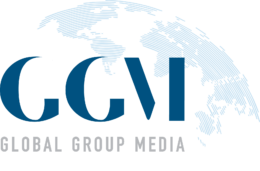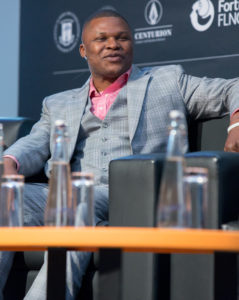 NJ Ayuk, CEO Centurion Law Group
NJ Ayuk, CEO Centurion Law Group
![]()
Centurion Law Group was created in 2007 to provide legal services to oil and gas firms in Equatorial Guinea. What challenges have you encountered and how have you dealt with them over the years?
![]() Centurion is a Pan-African corporate law conglomerate, with the widest reach across Africa of any major law firm.
Centurion is a Pan-African corporate law conglomerate, with the widest reach across Africa of any major law firm.
We have far reaching contacts in major African jurisdictions and have been pivotal in the structuring, negotiation and implementation of some of the largest oil and gas projects in sub-Saharan Africa. Our primary responsibilities have been bridging the gap between African governments and indigenous and international companies, on issues such as corporate commercial matters, litigation, compliance, local content, CSR and FCPA matters.
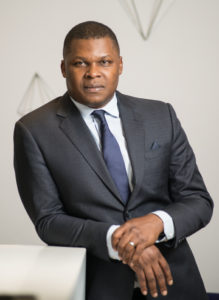
NJ Ayuk
Due to the fact that our transactions are multi-jurisdictional and cross-boundary, Centurion is established in 5 cities across Africa; Accra, Douala, Equatorial Guinea, Johannesburg and Port Louis in Mauritius; with strategic partnerships across the continent. This ensures that even if our client is a Nigerian company, looking to set up in Cameroon, we have lawyers on ground who are versed in local law, able to practice in the region and ready to act upon instruction. Our lawyers are also multi-lingual and speak the official lingua francas of Africa (English, Afrikaans, French, Spanish and Portuguese), ensuring that we can communicate effectively in any continental region our clients want to do business in.
Specifically, in Equatorial Guinea, when Centurion was first established the oil and gas market there was still growing, and we were able to have a head-start in the sector. We contributed to drafting many of the oil and gas regulations currently in place in Equatorial Guinea and actually facilitated the National Content Regulations, which revolutionized the local content sector in the country, and provided much needed stability and due process in the sector.
Centurion is regarded as one-stop shop firm. Providing legal, business and technical advisory services. So a client, not only gets a law firm to give it legal advisory services, we can also set up and incorporate a business, anywhere on the continent, and give technical advice across the value chain (upstream, midstream and downstream), as needed.
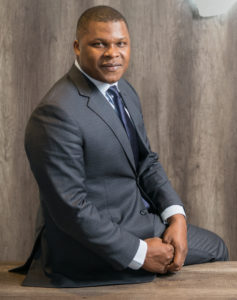
NJ Ayuk
![]() The oil and gas sector is integral to the economies of many developing countries. How does Centurion deal with important extractive projects that carry are laden with risks?
The oil and gas sector is integral to the economies of many developing countries. How does Centurion deal with important extractive projects that carry are laden with risks?
![]() Part of what Centurion does is risk analysis against the backdrop of our many years of experience in oil and gas regions with different socio-political climate as well as varying security situations. Sometimes, the answer may be that it is not the right time to step in based on the current volatility which, neither a sound economic or legal structure can cure. However, this also means that when we give the green light, it is safe to invest and when we signal otherwise, it is time to pull back.
Part of what Centurion does is risk analysis against the backdrop of our many years of experience in oil and gas regions with different socio-political climate as well as varying security situations. Sometimes, the answer may be that it is not the right time to step in based on the current volatility which, neither a sound economic or legal structure can cure. However, this also means that when we give the green light, it is safe to invest and when we signal otherwise, it is time to pull back.
We always do our homework and build great relationships across board to ensure positive cooperation throughout the life of these projects. We develop reflexes along the way which we can increasingly rely upon and consult adequately when required.
Even in the most volatile climates, with sufficient political will, which we are many times able to measure, oil and gas business can be done with the right partnerships.
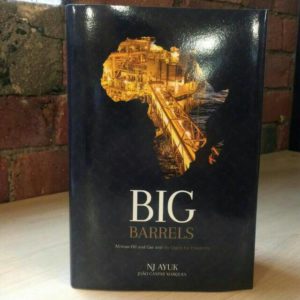
Big Barrels by NJ Ayuk
![]() Your new book, Big Barrels: African Oil & Gas and the Quest for Prosperity, talks about how oil and gas resources has and can improve African societies. Can you tell us more about the impact you expect the book to make and what inspired you to write it?
Your new book, Big Barrels: African Oil & Gas and the Quest for Prosperity, talks about how oil and gas resources has and can improve African societies. Can you tell us more about the impact you expect the book to make and what inspired you to write it?
![]() The impact I expect, is that Big Barrels changes the narrative on energy in Africa. For too long, there has been the misinterpreted view that energy-rich countries undeniably suffer from and are often victimized by the effects of the ‘resource curse’. The reality, could not be further from it, and that popular misconception, inspired me to want to make it clear, that the responsible and sustainable development of these resources is not only possible, but may be the quickest and most effective route to peace and prosperity for Africa. The question of how this can be done has been outlined in detail in the book.
The impact I expect, is that Big Barrels changes the narrative on energy in Africa. For too long, there has been the misinterpreted view that energy-rich countries undeniably suffer from and are often victimized by the effects of the ‘resource curse’. The reality, could not be further from it, and that popular misconception, inspired me to want to make it clear, that the responsible and sustainable development of these resources is not only possible, but may be the quickest and most effective route to peace and prosperity for Africa. The question of how this can be done has been outlined in detail in the book.
The simple fact is that oil and gas provides African countries with the fastest route to prosperity and natural resources are a pedestal for building nations, building economies and building wealth. The world view is that Africa is just a source of raw materials, when in fact, the true value of oil and gas in Africa is a source of innovation, wealth and job creation.
The reception to Big Barrels has been tremendous and it is now been distributed worldwide, with talks to translate it into several languages. I’ve had people from all over the world reach out to me; Africans, thankful that Africa is not been presented in its usual poverty-stricken light, and foreigners appreciative of the fact that the other side to Africa is being highlighted.
Any change in how things are done (positive or negative) must start from a change in the mindset of the actors. As stated in the Book, the attempt is not to deny or ignore the existence of serious problems in the African Oil and Gas space. However, the discussions about these problems often drive the narrative and takes no note of the fact that significant progress is being made and has almost been perfected in many instances. Take accountability in Ghana or even Nigeria, where local content development has been remarkable. Big Barrels aims at changing the mindset of the impossibility to that of endless possibilities.
In Big Barrels, we drown the noise, separate the wheat from the chaff and confidently assert that Africa can and is moving in the right direction.
